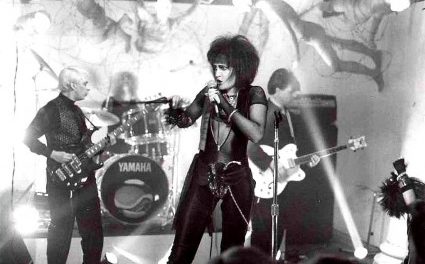
Illusion is the ultimate weapon.
For too long we have been delinquent in our duties as supreme judges of the nature of industrial music and culture. For too long we have hidden behind mealy-mouthed equivocation out of a desire to keep the peace. No more. On this episode of We Have A Technical we at last embrace our destinies as the Arbiters of Industrial and pass judgement on the rivetness of all things great and small. Should you deign to dispute our rulings you may do so on social media or in the comments below, but remember that your petitions will be to us as the flitting of gnats is to an intractable basalt column. You can rate and subscribe on iTunes, Google Play Music, or download directly or stream from Spotify or the widget down below.





I just listened to this last night, and OH BOY DO I HAVE OPINIONS!!!!!
Some years ago, I came up with a capsule definition of industrial music, that inevitably won’t jibe 100% with anybody else’s definition, but I feel captures the essence of industrial music as I understand it better than most other descriptions I’ve heard. So here goes nothing. Industrial music is:
1. Music that has a dark, gritty edge to its sound, lyrical concepts, or conceptual foundations, largely rooted in the seamy underbelly of modern life, deindividualization and alienation in the face of capitalism, technology, and the power structures they reify, or speculation about the horrors the future may hold.
AND
2. Music that has a strong electronic base OR is made with unconventional instruments and sound sources, or conventional instruments and sound sources used in unconventional ways.
We can extend this definition to industrial culture and industrial aesthetics, and answer some of the questions you posed in this podcast.
With that in mind, I posit that The Matrix is NOT industrial, but rather cyberpunk. Cyberpunk and industrial share a lot of commonalities, have evolved in parallel ways, and have seen the usual crossovers and mutual influences. Both are concerned with the relation of the individual to technology and power, in particular on the transformative power of information. BUT. Cyberpunk is more concerned with transcendence of gritty reality, whereas industrial is firmly rooted in the Desert of the Real. The messianic and transhumanistic strains you identified in the podcast point decisively away from the industrial aesthetic. Neo is here to save humanity using his mastery of the Matrix. Whether or not he succeeds in the end, no such triumph is available or even thinkable in an industrial context, where victory consists of maintaining your autonomy as an individual while the rest of the world grinds on, in finding a space where you can be free of the Control Images and Control Machines, even if that space is only as large as the interior of your skull.
Anyway.
Thank you for paying that Suzanne Vega song. I had heard that she had done some industrial-ish work in the early Nineties, but never checked it out. I was NOT prepared!
Sincerely yours, ruling with technology,
3R1N